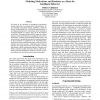Free Online Productivity Tools
i2Speak
i2Symbol
i2OCR
iTex2Img
iWeb2Print
iWeb2Shot
i2Type
iPdf2Split
iPdf2Merge
i2Bopomofo
i2Arabic
i2Style
i2Image
i2PDF
iLatex2Rtf
Sci2ools
AGENTS
1997
Springer
1997
Springer
Modeling Motivations and Emotions as a Basis for Intelligent Behavior
We report on an experiment to implement an autonomous creature situated in a two-dimensional world, that shows various learning and problem-solving capabilities, within the Society of Mind framework. This goal is approached from a developmental perspective, where phases in the experiment correspond broadly to cognitive stages in the development of an infant. This paper describes the first stage, the creature being a newborn whose behavioris strongly drivenby motivational states—impulses to action basedon bodily needs—and basicemotions—peripheralandcognitive responsestriggered by the recognition of a significant event. Physiological parameters are used to model both concepts, which are seen by analogy with control systems. Motivations drive behavior selection and organization based on the notions of arousal and satiation, and the exploitation principle. Emotions exert further control by sending “hormones”that may affect the intensity of the selected behavior, enable it, or ...
AGENTS 1997 | Autonomous Creature | Drivenby Motivational States—impulses | Motivations Drive Behavior | Security Privacy |
| Added | 07 Aug 2010 |
| Updated | 07 Aug 2010 |
| Type | Conference |
| Year | 1997 |
| Where | AGENTS |
| Authors | Dolores Cañamero |
Comments (0)

